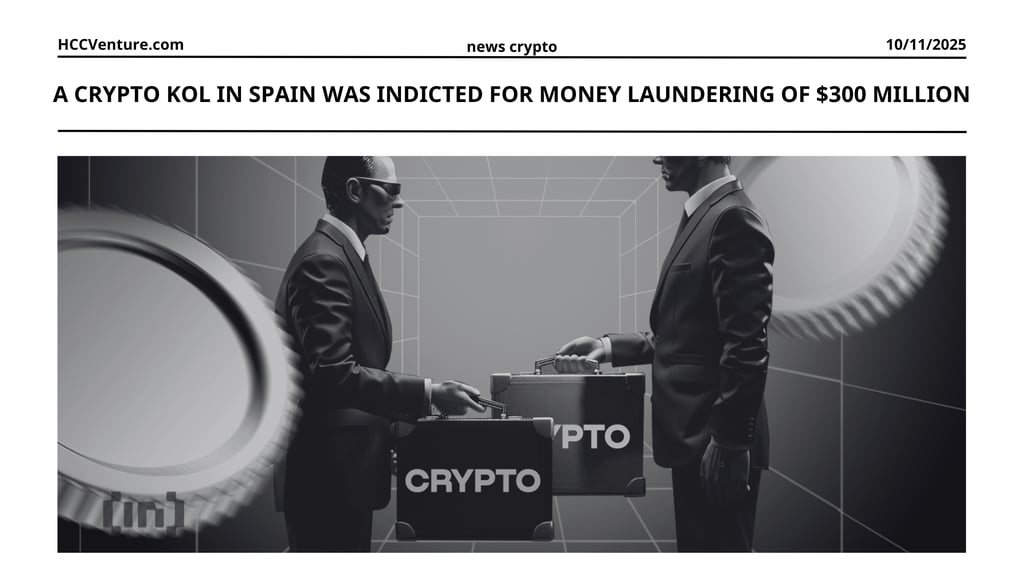A Crypto KOL in Spain was indicted for money laundering of $300 million
Álvaro Romillo Castillo, a prominent figure in the Spanish cryptocurrency scene known as CryptoSpain, has been arrested by authorities on charges of money laundering worth up to $300 million.
11/10/20252 min read


Dawn Raid on the CryptoSpain Empire
Romillo, 35, a self-proclaimed crypto evangelist with over 500,000 followers on X and Telegram, was arrested at his home in Madrid in the early hours of November 7, along with two associates, as part of Operation Madeira – a joint investigation between the Central Operational Unit of the Civil Police and the National Court.
Authorities seized laptops, phones and documents detailing Madeira Investment Club (MIC), an “investment vehicle” launched in 2022 that lured victims with guaranteed monthly returns of 20-40% on “crypto-backed” contracts tied to obscure assets like NFTs and DeFi yields.
Initial findings suggest the suspect and a small group of accomplices laundered money through stablecoins, private mixers, and offshore exchanges, with some of the funds eventually converted into luxury assets — including high-end real estate in Marbella and Dubai, supercars, and gold-backed tokens.
The Spanish National Police confirmed that more than 70 digital wallets have been frozen and 15 bank accounts across multiple jurisdictions have been seized, pending forensic financial analysis.
Tracing money laundering activities
The operation allegedly operated as a multi-layered Ponzi structure, disguised as a “decentralized asset management platform.” Investors were promised annual returns of 20–30%, allegedly powered by automated algorithmic trading on Binance and Coinbase Pro.
However, according to the investigation:
There is no verifiable trading activity or audited fund performance.
Investor deposits were redirected to a network of shell companies registered in Malta, Andorra and the Cayman Islands.
The money is then transferred back to Spain through crypto-to-fiat money laundering channels, including OTC brokers and fake invoicing schemes.
Authorities claim that the scheme's "liquidity pools" and "profit vaults" were fabricated dashboards — an elaborate scam designed to mimic legitimate DeFi protocols while obscuring the true outflows of funds.
Digital Investigation
The arrests are the culmination of a joint operation between Spain's anti-cybercrime units, Europol and the US Department of Justice's Cyber Security Division, following numerous investor complaints and suspicious transaction reports (STRs) filed by European exchanges.
Europol's digital forensics team tracked on-chain movements of several stablecoins, including USDT and USDC, routed through private mixers and cross-chain bridges, ultimately linking them to wallets directly linked to CryptoSpain's promotional campaigns.
Legal and Regulatory Implications
The case could set an important precedent for cryptocurrency-related criminal prosecutions in the European Union, particularly under Spain’s newly expanded Anti-Money Laundering (AML) and Virtual Asset Service Provider (VASP) laws, which come into full effect in 2024.
If convicted, CryptoSpain could face:
Maximum 12 years in prison.
Permanent trading ban.
Asset seizures exceeding $200 million.
The trial is expected to attract international attention, as prosecutors are also seeking to determine whether the defendant maintained partnerships with foreign exchanges and unregistered cryptocurrency exchanges that are subject to US or EU sanctions.
Disclaimer: The information presented in this article is the author's personal opinion in the cryptocurrency field. It is not intended to be financial or investment advice. Any investment decision should be based on careful consideration of your personal portfolio and risk tolerance. The views expressed in this article do not represent the official position of the platform. We recommend that readers conduct their own research and consult with a professional before making any investment decisions.
Explore HCCVenture group
HCCVenture © 2023. All rights reserved.

Connect with us
Popular content
Contact to us
E-mail : sp_contact@hccventure.com
Register : https://linktr.ee/holdcoincventure
Disclaimer: The information on this website is for informational purposes only and should not be considered investment advice. We are not responsible for any risks or losses arising from investment decisions based on the content here.


TERMS AND CONDITIONS • CUSTOMER PROTECTION POLICY
ANALYTICAL AND NEWS CONTENT IS COMPILED AND PROVIDED BY EXPERTS IN THE FIELD OF DIGITAL FINANCE AND BLOCKCHAIN BELONGING TO HCCVENTURE ORGANIZATION, INCLUDING OWNERSHIP OF THE CONTENT.
RESPONSIBLE FOR MANAGING ALL CONTENT AND ANALYSIS: HCCVENTURE FOUNDER - TRUONG MINH HUY
Read warnings about scams and phishing emails — REPORT A PROBLEM WITH OUR SITE.
